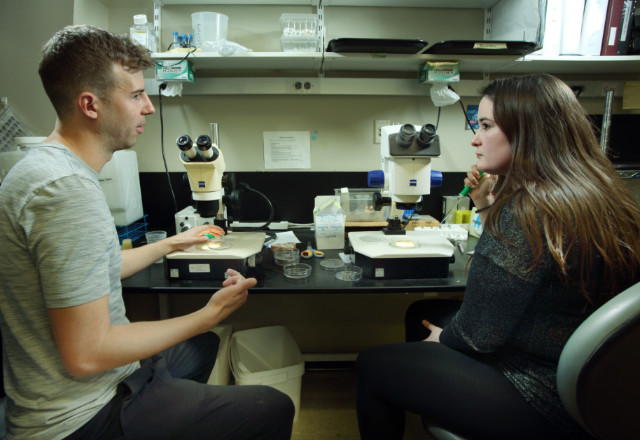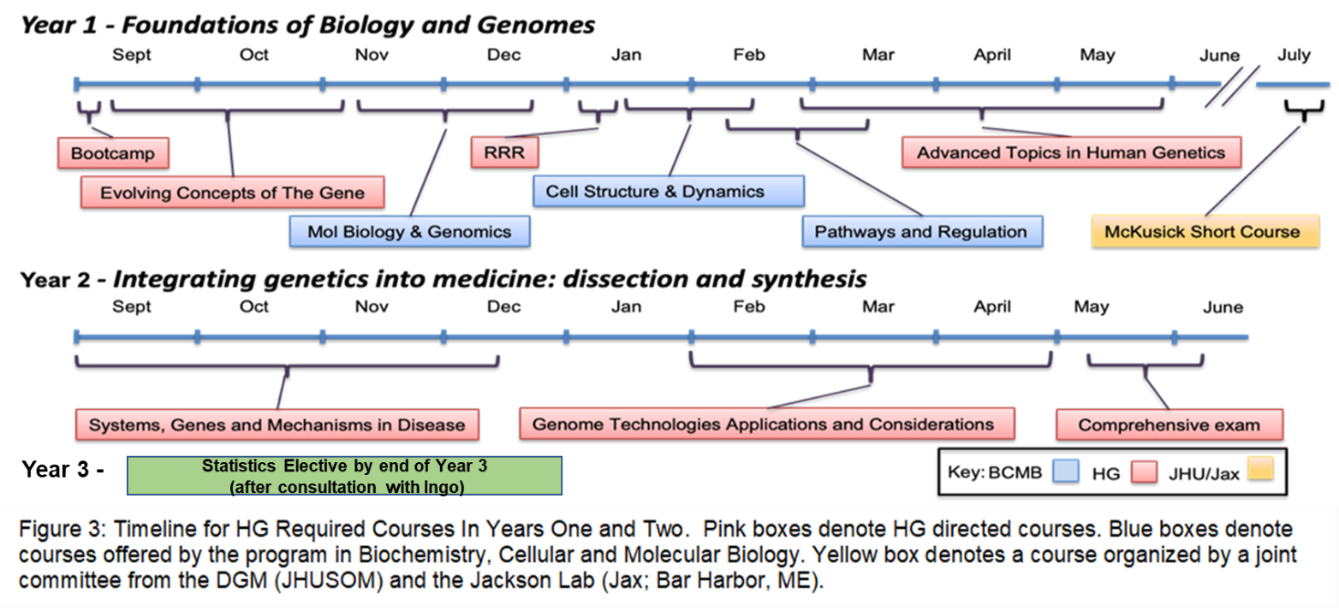Curriculum and Overall Training Plan
The overall goal of our Human Genetics and Genomics Graduate Program is to educate the next generation of leaders in human genetics. We seek to train independent scientists who are passionately curious about the role that genetic variation plays in the human condition. As human geneticists they will work directly or indirectly on problems related to the human organism. We believe, therefore, that an understanding of human biology in terms of normal development and function and the nature of and response to disease, and the role played by variation therein, is essential preparation for their future. Thus, our program sets out a unique vision aimed at equipping our trainees to dissect the many and varied roles of genetic variation in human biology and disease, integrating genetic thinking with a human/clinically oriented focus. In doing so, we place emphasis on developing strong foundational understanding of genetics in human biology and disease; on the application of emerging genomic technologies in dissecting genetic mechanisms; and on biologically informed, critical thinking, guided by thought leaders across all of human genetics, medicine, biology, data science and beyond. Training is provided by a diverse cohort of world-class faculty whose interests span the gamut of contemporary genetic research, from translational study, and population-directed genetic disease study to emerging genomic technologies, big data analysis and machine learning.

Our integrated emphasis makes our program distinct on the Hopkins campus and the national scene and is particularly appealing to students who want to use state of the art genetics and genomics approaches to answer questions relevant to human genetic disease. Ours is a demanding curriculum but one that we believe best equips our students to become independent investigators in human genetics.
Mission: Equipping HGG students to dissect the role of genetic variation in modulating human phenotypes. We set out to train an emerging generation of scientists and thought leaders who understand the roles of genes in normal human development and physiologic homeostasis and appreciate the contribution of genetic variation to health and disease. Training integrates standard course requirements, electives and independent research. To this end, we have developed (and recently revised) a core curriculum that weaves together critical components of training in human genetics across the first two academic years.
In their first year, our trainees take foundational genetics courses “Evolving concepts of the gene” – a mix of didactic, seminar and discussion sessions providing a robust introduction to classical papers in genetics, as well as the spectrum of functional variation and modes of inheritance; “Molecular Biology and Genomics” – a critical introduction to the genomes of prokaryotic and eukaryotic organisms; “Cell Structure and Dynamics” and “Pathways and Regulation” which introduce foundational topics in cell biology, bioenergetics, pathways and metabolism including cellular processes and related homeostatic mechanisms; Rigor and Reproducibility in Research (RRR); and “Advanced Topics in Human Genetics'' covering an array of established and emerging fields of genetic research. Also, in year 1, HGG students take a Computational Bootcamp, to equip them with fundamental skills in computation and statistics.
In their second year, trainees take two truly innovative courses. First, “Systems, Genes and Mechanisms in Disease,” provides a system-directed training in normal and pathological states, and the genetic mechanisms that underpin disease risk/progression. This course is designed to put their genetic training in a human biological and pathological context. Second, “Genomic Technologies Applications and Considerations, GTAC” provides trainees with the concepts and experimental design skills that are necessary to deploy common use and emerging genomic experimental strategies, ranging from next generation sequencing (long and short read) through variant detection, chromatin and transcriptional assays to large scale genome engineering. A statistics course of the student’s choosing must be completed by the end of year 3. The course must be approved by program directors.
By completion of the program, students must also take at least three graduate level elective courses that synergize with their research. Electives may be chosen from all available graduate level courses within JHUSOM.
In their first year, our trainees rotate in up to three laboratories, providing the opportunity to explore different questions, experimental approaches, lab dynamics and mentorship styles. The 72 HGG program laboratories span a spectrum of research interests in fields including computational study of DNA regulatory elements, rare metabolic and mitochondrial disease, cardiovascular disease, retinal degeneration, cancers, common complex phenotypes, employing cutting edge genomic, transcriptomic and machine learning strategies, as well as public health, epidemiology and Ethical, Legal and Social Implications.
Students also participate in the scientific sessions of the Department of Genetic Medicine including a weekly journal club, research seminars and special guest lecture series (Barton Childs lecture, Victor McKusick lecture) throughout their training. They also engage in a range of other components established to support their professional and personal development. These include: many opportunities for research communication, peer support systems (peer families), peer mentoring and tutoring, and attendance at workshops on career exploration and degree completion, engaging with visiting seminar speakers, as well as training in the 3Rs, responsible conduct of research, and ethics, diversity equity and inclusion. Moreover, they are exposed to the day-to-day machinations of basic and clinical research, grant and manuscript preparation, the editorial process, collaborative relationships, mentoring, and to perceptions of their science by the public and in the media. They develop professional relationships with mentors and preceptors that hold both accountable. Integration of these challenging foundational and clinically-oriented courses with independent research lab rotations and in-depth thesis research uniquely prepares HGG trainees to tackle emerging biomedical challenges.
Curriculum

Year One
- Bootcamp
- Human Genetics Core Discussions (intro to preceptors)
- The Evolving Concept of the Gene
- Introduction to Research Ethics
- Molecular Biology and Genomics
- Rigor and Reproducibility in Research
- Cell Structure and Dynamics
- Pathways and Regulation
- Advanced Topics in Human Genetics
- Laboratory rotations x 3
- Professional Development and Career Office OPTIONS curriculum: Attending 2 Investigating Careers and Networking (iCAN) Speaker Series events
- Summer: Short Course in Human and Mammalian Genetics and Genomics, two week course in July at the Jackson Laboratory in Bar Harbor, Maine
Year Two
- Systems, Genes and Mechanisms of Disease
- Independent Research
- Genome Technologies, Applications and Considerations
- Comprehensive exam
- Professional Development and Career Office OPTIONS curriculum: Attending 2 Investigating Careers and Networking (iCAN) Speaker Series events
- Dean’s Research Integrity Lecture Series (see below)
- Grant writing workshop. Please see the section on this page entitled "NIH F award workshop" for links to the material
Year Three & Beyond
- Independent Research
- Statistics course -your choice but must be approved and completed by end of year 3
- Three electives (MD/PhD students must take two electives)
- Dean's Research Integrity Lecture Series
- Year Three: OPTIONS curriculum: Join one of 5 career communities; attend 6 workshops and complete informational interview assignment
- Year 4 and Beyond: OPTIONS curriculum: Meet with PDCO staff to create personalized plan for your specific career goals
